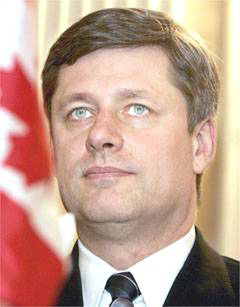
[Editor's note: Every day this week The Tyee publishes its picks for the top stories of 2006. Today, the rise of Stephen Harper.]
Stephane Dion dominated headlines in December. But 2006 was still Stephen Harper’s year. Harper’s journey from far-right wonk to Prime Minister of Canada still seems improbable more than 11 months on. And it is our choice for the number three big story of the past year.
After the 2004 federal election, many pundits wrote Stephen Harper off. He had no charisma, they said. And he was too extreme for voters East of Saskatchewan. With his quote book stuffed with pithy put-downs (second tier-socialistic country anyone?) and his eerie Lego-like hair, Harper could never topple Paul Martin’s Liberals. Or at least that’s how it was supposed to go.
But while Martin spent the months after the election earning the nickname Mr. Dithers, Harper was relentlessly plotting strategy. He built a new team of advisors – including some from the group that helped Australia’s John Howard win three consecutive elections, and sculpted a new moderate conservatism. When the Martin government collapsed in Dec. 2005, Harper was ready.
The new team muzzled Harper’s extreme right candidates and hacked the hard edges off his platform. Out were musings on private health care and any mention of the Iraq war. In was GST cuts, turtlenecks and praise for the Canada Health Act. “On the face of it,” The Tyee’s Tom Barrett wrote at the time, “Harper seem[ed] to have undergone the most dramatic character transformation since Ebenezer Scrooge sent the kid to buy the goose.”
It worked. With the help of an inept Liberal election team, Harper knocked Martin from power and won a minority government on Jan. 22. But had he really “evolved”? Or was the old fire-waller just waiting for a chance to jump out?
In the early months of the new government, Harper moved steadily to keep key campaign promises. He cancelled Ken Dryden’s national child-care program, lopped a point off the GST, and, based on some pretty wonky science, moved to increase both minimum and maximum sentences for violent crimes. Also ready to go was a new Federal Accountability Act (minus some key election provisions). But that spent most of the year bogged down in the Senate.
Harper also extended Canada’s military mission
in Afghanistan until 2009. The move provoked a hugely mixed response. Tyee
columnist Murray Dobbin called the mission a debacle designed to assuage the
PM’s ego. While UBC’s Michael Byers said none of the arguments in favour of our
presence held water.
But not everyone was so negative. A Canadian researcher in the area said to leave now would be equivalent to “giving Germany back to the Nazis.” Norine MacDonald, founder of the Senlis Council, does think the mission needs to be rebalanced, however, a call echoed by everyone from Gerard Kennedy to Jack Layton.
But at the end of the year, Harper remained defiant. "Rebalance the mission,” he said in a year-end interview. “What does that mean? I mean, what the hell does that mean?”
The other big thorn in the Harper platform over the last year was the environment. Harper’s line, from the beginning, was that the Kyoto Accord was a fantasy. After a decade of Liberal inaction, to reach the Kyoto milestones would cripple Canada's economy. In its stead he introduced the Clean Air Act. The Act promised deep cuts in greenhouse gas emissions… by 2050.
Politically, Harper had a mixed first year. He started on a tone-deaf note, appointing Liberal turncoat David Emerson and un-elected advisor Michael Fortier to his cabinet. He later waged a turf war with the Parliamentary press gallery, unsuccessfully resurrected the well dead gay marriage issue and introduced a Senate reform plan that seemed designed to please no one.
On the other hand, Harper handily outplayed Bloc leader Gilles Duceppe on the Quebec as nation issue, won the praise of many usual critics for doing what the Liberals couldn’t by closing the Income Trust loophole and, at worst, fought the gallery to a draw. Still despite a year long free ride granted by the Liberals never ending leadership, Harper finishes 2006 no higher in the polls than he started it.
So, has Stephen Harper evolved? Tough to say. Evolution
though, may be the wrong term to use. He did, after all, appoint Stockwell Day
to cabinet. ![]()















Tyee Commenting Guidelines
Comments that violate guidelines risk being deleted, and violations may result in a temporary or permanent user ban. Maintain the spirit of good conversation to stay in the discussion.
*Please note The Tyee is not a forum for spreading misinformation about COVID-19, denying its existence or minimizing its risk to public health.
Do:
Do not: